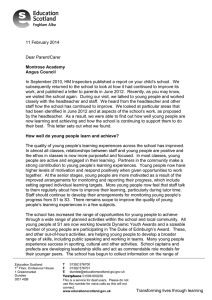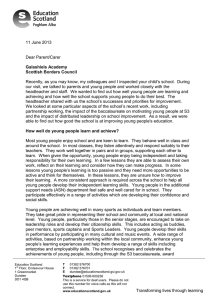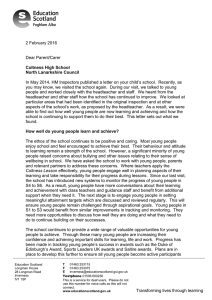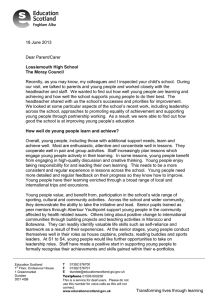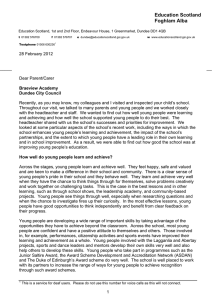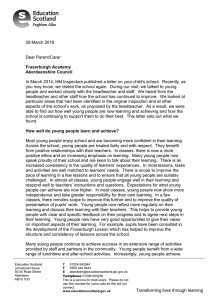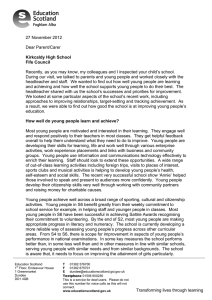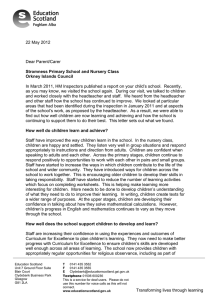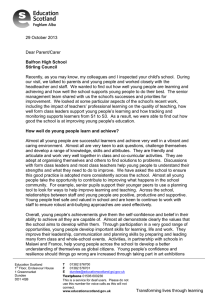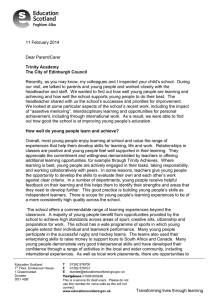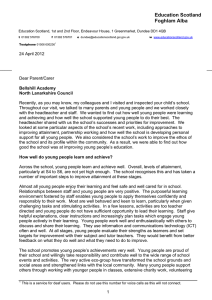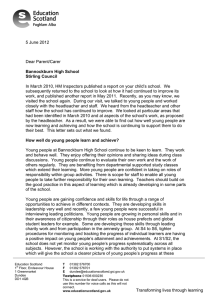26 June 2012 Dear Parent/Carer
advertisement
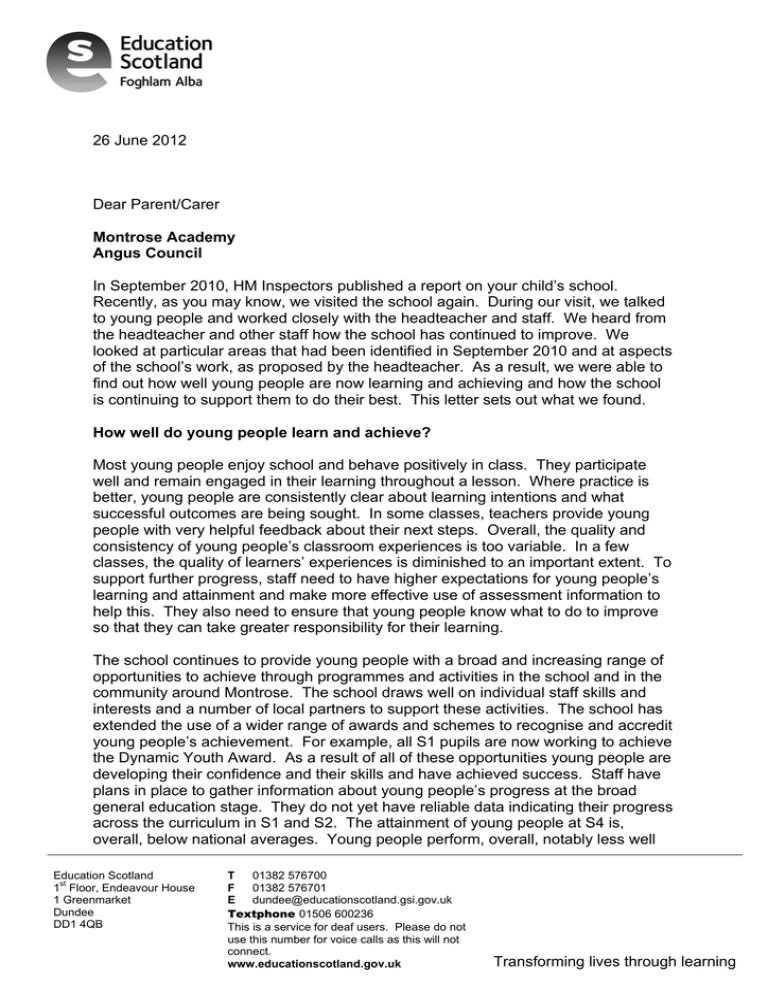
26 June 2012 Dear Parent/Carer Montrose Academy Angus Council In September 2010, HM Inspectors published a report on your child’s school. Recently, as you may know, we visited the school again. During our visit, we talked to young people and worked closely with the headteacher and staff. We heard from the headteacher and other staff how the school has continued to improve. We looked at particular areas that had been identified in September 2010 and at aspects of the school’s work, as proposed by the headteacher. As a result, we were able to find out how well young people are now learning and achieving and how the school is continuing to support them to do their best. This letter sets out what we found. How well do young people learn and achieve? Most young people enjoy school and behave positively in class. They participate well and remain engaged in their learning throughout a lesson. Where practice is better, young people are consistently clear about learning intentions and what successful outcomes are being sought. In some classes, teachers provide young people with very helpful feedback about their next steps. Overall, the quality and consistency of young people’s classroom experiences is too variable. In a few classes, the quality of learners’ experiences is diminished to an important extent. To support further progress, staff need to have higher expectations for young people’s learning and attainment and make more effective use of assessment information to help this. They also need to ensure that young people know what to do to improve so that they can take greater responsibility for their learning. The school continues to provide young people with a broad and increasing range of opportunities to achieve through programmes and activities in the school and in the community around Montrose. The school draws well on individual staff skills and interests and a number of local partners to support these activities. The school has extended the use of a wider range of awards and schemes to recognise and accredit young people’s achievement. For example, all S1 pupils are now working to achieve the Dynamic Youth Award. As a result of all of these opportunities young people are developing their confidence and their skills and have achieved success. Staff have plans in place to gather information about young people’s progress at the broad general education stage. They do not yet have reliable data indicating their progress across the curriculum in S1 and S2. The attainment of young people at S4 is, overall, below national averages. Young people perform, overall, notably less well Education Scotland st 1 Floor, Endeavour House 1 Greenmarket Dundee DD1 4QB T 01382 576700 F 01382 576701 E dundee@educationscotland.gsi.gov.uk Textphone 01506 600236 This is a service for deaf users. Please do not use this number for voice calls as this will not connect. www.educationscotland.gov.uk Transforming lives through learning than in schools serving those with similar needs and backgrounds. Attainment at Higher grade level in S5 improved over the past year. Attainment at S5 and S6 remains below or in line with national averages. Again, young people achieve notably less well than in schools serving young people with similar needs and backgrounds. Most young people moved on to positive destinations after school in each of the last three years. How well does the school support young people to develop and learn? Good resources and approaches are occasionally used to support young people progress well in their learning. The pace of progress in lessons is sometimes appropriate, but is often too slow or too fast for some young people. In too many lessons, tasks still need to be better matched to the needs of individual young people or groups. Too many lessons lack challenge. Support for learning staff now spend more time supporting young people within subject classes. This is helping young people to achieve more. The school is aware that more needs to be done to ensure all staff meet their responsibility to make appropriate provision for young people in their classes. Pastoral support for young people is a particular strength of the school. The school has continued to develop the curriculum well in line with Curriculum for Excellence. It now has in place a clear rationale and design for delivering the broad general education for all young people. Staff are using the experiences and outcomes to plan courses and programmes effectively across all curricular areas, and have developed natural links across a range of subject areas. They should now find ways to plan more closely with partners when developing the curriculum. Most staff now have a better understanding of their responsibility for developing literacy, numeracy and health and wellbeing. Senior managers are monitoring more closely, and now need to develop further approaches to tracking the development of skills across all areas of young people’s learning. This will be achieved by the implementation of more personalised planning and profiling of progress for all learners. How well does the school improve the quality of its work? The school is aware that it needs to refine its improvement plan so that it gives staff, parents, young people and all other stakeholders a clear picture of the main areas which the school is working to improve. School staff are now clearer about, and more committed to, self-evaluation processes within the wider work of the school. They are now working more effectively together to improve their teaching and organise training opportunities in school. Staff are beginning to consult young people more about their learning experiences in classes. Examples of good practice could be more widely shared across the school. The school has made progress in working with a wider range of partners, including young people and their parents. This now needs to be developed further so that they are increasingly involved with the school in planning for improvement. 2 What happens next? There is evidence of improvement in some aspects of the school’s work. Young people are now achieving more and the curriculum is developing well in line with national expectations. A range of circumstances has contributed to uneven improvement in the school following our original inspection. More remains to be done to ensure that the quality of learning, teaching and meeting young people’s learning needs is consistently high. Attainment still requires improvement. As a result, we will continue to engage with the school and the education authority in monitoring progress. We will carry out another follow-through visit within 18 months of the publication of this letter. This will result in a further letter to parents reporting on the extent of the improvement that has been achieved. Ken McAra HM Inspector Please contact us if you want to know how to get the report in a different format, for example, in a translation. You can contact us at enquiries@educationscotland.gsi.gov.uk or write to us at BMCT, Education Scotland, Denholm House, Almondvale Business Park, Almondvale Way, Livingston EH54 6GA. If you want to give us feedback or make a complaint about our work, please contact 01506 600200, or write to us at the above address or e-mail: feedback@educationscotland.gsi.gov.uk. 3
